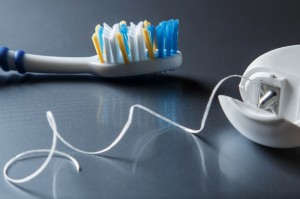 Trust us, we’ve heard every dental myth and superstition in the book. And, while there are a few we certainly wish were true (like having a gap in your front teeth means you’ll live a long life!), most myths develop out of people’s fears and misunderstandings about their oral hygiene. Below, we’ve listed four of the most common dental myths we’ve heard, and what the facts really are.
Trust us, we’ve heard every dental myth and superstition in the book. And, while there are a few we certainly wish were true (like having a gap in your front teeth means you’ll live a long life!), most myths develop out of people’s fears and misunderstandings about their oral hygiene. Below, we’ve listed four of the most common dental myths we’ve heard, and what the facts really are.
1. White Teeth Are Healthy Teeth
While it’s true that healthy teeth are generally light in color, this doesn’t mean that only blindingly white chompers are healthy. Some teeth naturally have a yellow tint, and that’s perfectly fine. However, any shades deeper than a pale yellow should be looked at by a dentist, as this can be a sign of tooth decay.
2. Bad Breath? Bad Brusher!
Poor brushing and flossing habits can definitely contribute to bad breath because you’re not getting rid of the bacteria that can cause funky odors. However, you can be the best brusher in the world and still have bad breath. How? The scents of foods and drinks you consume, like onions, garlic, and coffee, can linger in your mouth even after you brush. Avoiding these foods, or investing in a tongue scraper to help get rid of food particles in the back of your mouth, can help alleviate these problems. Certain illnesses can cause bad breath as well. If you’ve already tried the above, consider scheduling an appointment with your primary care doctor to see if your bad breath is a symptom of an underlying ailment.
3. Sweet Tooth = Bad Teeth
Sugars and carbohydrates break down into bacteria in the mouth, which is what causes cavities if left untreated. However, having a sweet tooth doesn’t mean you’ll have bad teeth — as long as you remember to brush and floss thoroughly after eating your favorite treats. This is particularly important for sticky sweets, which will cling to the teeth and can cause more damage if left to linger. Of course, too many sweets can be bad for your overall health, so be sure to balance out your sugar cravings with a healthful diet and plenty of exercise.
4. No Pain = No Problem
Just because your teeth don’t hurt doesn’t mean there aren’t problems. In fact, dental pain can mean that an underlying issue that could have been fixed earlier has now reached a crisis point. It’s important to remember that even people who take good care of their teeth can still develop cavities or oral health problems due to genetics or underlying illnesses. It’s important to visit your dentist regularly to help prevent problems before they start, and to help keep any chronic problems at bay before you have a painful — and costly — problem on your hands.
Dental myths are all too common, but there’s often a grain of truth buried in the superstition. By educating yourself on oral hygiene and knowing how to maintain a healthy mouth, you’ll be well on your way to ensuring that your teeth are always happy and healthy. Have you heard an odd or interesting dental myth you want us to bust? Let us know in the comments!







Leave a Reply